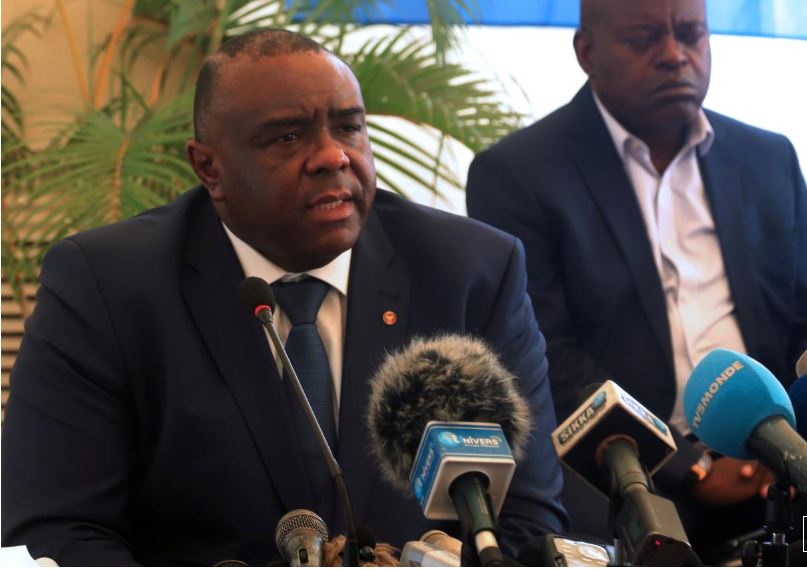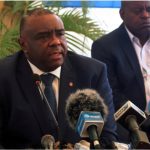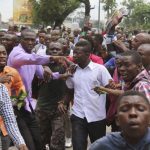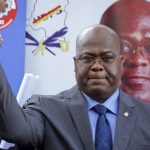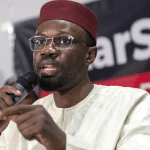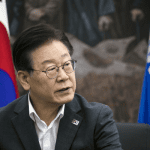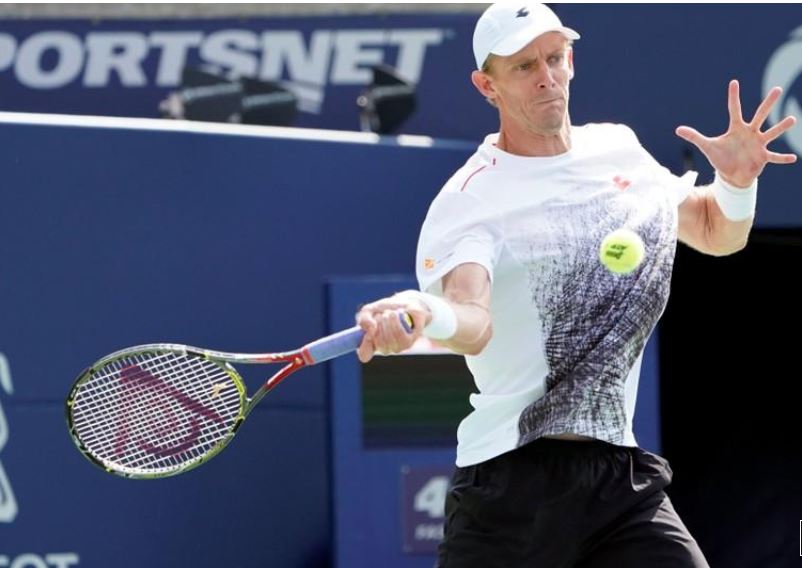The election commission of Democratic Republic of Congo has excluded opposition leader Jean-Pierre Bemba and three former prime ministers from the list of approved candidates for December’s presidential election, which was published on Friday.
Bemba, a former warlord who earlier in August returned to the Congolese capital Kinshasa to submit his candidacy for president after a decade in prison in The Hague for war crimes, had been seen as one of the frontrunners in the race to succeed incumbent Joseph Kabila.
The commission said a separate International Criminal Court conviction for witness tampering was the reason for Bemba’s exclusion from the list.
Bemba was acquitted on appeal at the International Criminal Court of war crimes and crimes against humanity for murder, rape and pillage committed by fighters he sent to Central African Republic in 2002 but his witness tampering conviction stands.
Opposition parties condemned the election commission’s decision, which can be appealed before the final list is published in September.
“Once again the current regime is showing its determination to suppress the electoral process,” they said in a joint statement before the commission published the list.
Last month, Bemba placed third in a rare public opinion poll on the likely outcome of the election, winning 17 percent support.
He is popular in western Congo, including the capital Kinshasa, and his exclusion could trigger a violent reaction by his supporters. Street battles between militiamen loyal to Bemba and state forces broke out in Kinshasha after he lost the 2006 election to Kabila.
After years of speculation over his intentions, Kabila consented earlier in August to obey the two-term limit imposed by the Central African country’s constitution by not entering his name for the poll set for Dec. 23.
As a parting shot, he picked a former interior minister, who has been placed under EU sanctions, to stand instead.
His choice of a die-hard loyalist suggested that the president, who came to power after his father’s assassination in 2001, intends to remain closely involved in national politics. He will be eligible to run again in 2023.
Former prime ministers Adolphe Muzito, Antoine Gizenga and Samy Badibanga were also among the six candidates excluded from the commission’s list.
The election commission of Democratic Republic of Congo has excluded opposition leader Jean-Pierre Bemba and three former prime ministers from the list of approved candidates for December’s presidential election, which was published on Friday.
Bemba, a former warlord who earlier in August returned to the Congolese capital Kinshasa to submit his candidacy for president after a decade in prison in The Hague for war crimes, had been seen as one of the frontrunners in the race to succeed incumbent Joseph Kabila.
The commission said a separate International Criminal Court conviction for witness tampering was the reason for Bemba’s exclusion from the list.
Bemba was acquitted on appeal at the International Criminal Court of war crimes and crimes against humanity for murder, rape and pillage committed by fighters he sent to Central African Republic in 2002 but his witness tampering conviction stands.
Opposition parties condemned the election commission’s decision, which can be appealed before the final list is published in September.
“Once again the current regime is showing its determination to suppress the electoral process,” they said in a joint statement before the commission published the list.
Last month, Bemba placed third in a rare public opinion poll on the likely outcome of the election, winning 17 percent support.
He is popular in western Congo, including the capital Kinshasa, and his exclusion could trigger a violent reaction by his supporters. Street battles between militiamen loyal to Bemba and state forces broke out in Kinshasha after he lost the 2006 election to Kabila.
After years of speculation over his intentions, Kabila consented earlier in August to obey the two-term limit imposed by the Central African country’s constitution by not entering his name for the poll set for Dec. 23.
As a parting shot, he picked a former interior minister, who has been placed under EU sanctions, to stand instead.
His choice of a die-hard loyalist suggested that the president, who came to power after his father’s assassination in 2001, intends to remain closely involved in national politics. He will be eligible to run again in 2023.
Former prime ministers Adolphe Muzito, Antoine Gizenga and Samy Badibanga were also among the six candidates excluded from the commission’s list.
The election commission of Democratic Republic of Congo has excluded opposition leader Jean-Pierre Bemba and three former prime ministers from the list of approved candidates for December’s presidential election, which was published on Friday.
Bemba, a former warlord who earlier in August returned to the Congolese capital Kinshasa to submit his candidacy for president after a decade in prison in The Hague for war crimes, had been seen as one of the frontrunners in the race to succeed incumbent Joseph Kabila.
The commission said a separate International Criminal Court conviction for witness tampering was the reason for Bemba’s exclusion from the list.
Bemba was acquitted on appeal at the International Criminal Court of war crimes and crimes against humanity for murder, rape and pillage committed by fighters he sent to Central African Republic in 2002 but his witness tampering conviction stands.
Opposition parties condemned the election commission’s decision, which can be appealed before the final list is published in September.
“Once again the current regime is showing its determination to suppress the electoral process,” they said in a joint statement before the commission published the list.
Last month, Bemba placed third in a rare public opinion poll on the likely outcome of the election, winning 17 percent support.
He is popular in western Congo, including the capital Kinshasa, and his exclusion could trigger a violent reaction by his supporters. Street battles between militiamen loyal to Bemba and state forces broke out in Kinshasha after he lost the 2006 election to Kabila.
After years of speculation over his intentions, Kabila consented earlier in August to obey the two-term limit imposed by the Central African country’s constitution by not entering his name for the poll set for Dec. 23.
As a parting shot, he picked a former interior minister, who has been placed under EU sanctions, to stand instead.
His choice of a die-hard loyalist suggested that the president, who came to power after his father’s assassination in 2001, intends to remain closely involved in national politics. He will be eligible to run again in 2023.
Former prime ministers Adolphe Muzito, Antoine Gizenga and Samy Badibanga were also among the six candidates excluded from the commission’s list.
The election commission of Democratic Republic of Congo has excluded opposition leader Jean-Pierre Bemba and three former prime ministers from the list of approved candidates for December’s presidential election, which was published on Friday.
Bemba, a former warlord who earlier in August returned to the Congolese capital Kinshasa to submit his candidacy for president after a decade in prison in The Hague for war crimes, had been seen as one of the frontrunners in the race to succeed incumbent Joseph Kabila.
The commission said a separate International Criminal Court conviction for witness tampering was the reason for Bemba’s exclusion from the list.
Bemba was acquitted on appeal at the International Criminal Court of war crimes and crimes against humanity for murder, rape and pillage committed by fighters he sent to Central African Republic in 2002 but his witness tampering conviction stands.
Opposition parties condemned the election commission’s decision, which can be appealed before the final list is published in September.
“Once again the current regime is showing its determination to suppress the electoral process,” they said in a joint statement before the commission published the list.
Last month, Bemba placed third in a rare public opinion poll on the likely outcome of the election, winning 17 percent support.
He is popular in western Congo, including the capital Kinshasa, and his exclusion could trigger a violent reaction by his supporters. Street battles between militiamen loyal to Bemba and state forces broke out in Kinshasha after he lost the 2006 election to Kabila.
After years of speculation over his intentions, Kabila consented earlier in August to obey the two-term limit imposed by the Central African country’s constitution by not entering his name for the poll set for Dec. 23.
As a parting shot, he picked a former interior minister, who has been placed under EU sanctions, to stand instead.
His choice of a die-hard loyalist suggested that the president, who came to power after his father’s assassination in 2001, intends to remain closely involved in national politics. He will be eligible to run again in 2023.
Former prime ministers Adolphe Muzito, Antoine Gizenga and Samy Badibanga were also among the six candidates excluded from the commission’s list.
The election commission of Democratic Republic of Congo has excluded opposition leader Jean-Pierre Bemba and three former prime ministers from the list of approved candidates for December’s presidential election, which was published on Friday.
Bemba, a former warlord who earlier in August returned to the Congolese capital Kinshasa to submit his candidacy for president after a decade in prison in The Hague for war crimes, had been seen as one of the frontrunners in the race to succeed incumbent Joseph Kabila.
The commission said a separate International Criminal Court conviction for witness tampering was the reason for Bemba’s exclusion from the list.
Bemba was acquitted on appeal at the International Criminal Court of war crimes and crimes against humanity for murder, rape and pillage committed by fighters he sent to Central African Republic in 2002 but his witness tampering conviction stands.
Opposition parties condemned the election commission’s decision, which can be appealed before the final list is published in September.
“Once again the current regime is showing its determination to suppress the electoral process,” they said in a joint statement before the commission published the list.
Last month, Bemba placed third in a rare public opinion poll on the likely outcome of the election, winning 17 percent support.
He is popular in western Congo, including the capital Kinshasa, and his exclusion could trigger a violent reaction by his supporters. Street battles between militiamen loyal to Bemba and state forces broke out in Kinshasha after he lost the 2006 election to Kabila.
After years of speculation over his intentions, Kabila consented earlier in August to obey the two-term limit imposed by the Central African country’s constitution by not entering his name for the poll set for Dec. 23.
As a parting shot, he picked a former interior minister, who has been placed under EU sanctions, to stand instead.
His choice of a die-hard loyalist suggested that the president, who came to power after his father’s assassination in 2001, intends to remain closely involved in national politics. He will be eligible to run again in 2023.
Former prime ministers Adolphe Muzito, Antoine Gizenga and Samy Badibanga were also among the six candidates excluded from the commission’s list.
The election commission of Democratic Republic of Congo has excluded opposition leader Jean-Pierre Bemba and three former prime ministers from the list of approved candidates for December’s presidential election, which was published on Friday.
Bemba, a former warlord who earlier in August returned to the Congolese capital Kinshasa to submit his candidacy for president after a decade in prison in The Hague for war crimes, had been seen as one of the frontrunners in the race to succeed incumbent Joseph Kabila.
The commission said a separate International Criminal Court conviction for witness tampering was the reason for Bemba’s exclusion from the list.
Bemba was acquitted on appeal at the International Criminal Court of war crimes and crimes against humanity for murder, rape and pillage committed by fighters he sent to Central African Republic in 2002 but his witness tampering conviction stands.
Opposition parties condemned the election commission’s decision, which can be appealed before the final list is published in September.
“Once again the current regime is showing its determination to suppress the electoral process,” they said in a joint statement before the commission published the list.
Last month, Bemba placed third in a rare public opinion poll on the likely outcome of the election, winning 17 percent support.
He is popular in western Congo, including the capital Kinshasa, and his exclusion could trigger a violent reaction by his supporters. Street battles between militiamen loyal to Bemba and state forces broke out in Kinshasha after he lost the 2006 election to Kabila.
After years of speculation over his intentions, Kabila consented earlier in August to obey the two-term limit imposed by the Central African country’s constitution by not entering his name for the poll set for Dec. 23.
As a parting shot, he picked a former interior minister, who has been placed under EU sanctions, to stand instead.
His choice of a die-hard loyalist suggested that the president, who came to power after his father’s assassination in 2001, intends to remain closely involved in national politics. He will be eligible to run again in 2023.
Former prime ministers Adolphe Muzito, Antoine Gizenga and Samy Badibanga were also among the six candidates excluded from the commission’s list.
The election commission of Democratic Republic of Congo has excluded opposition leader Jean-Pierre Bemba and three former prime ministers from the list of approved candidates for December’s presidential election, which was published on Friday.
Bemba, a former warlord who earlier in August returned to the Congolese capital Kinshasa to submit his candidacy for president after a decade in prison in The Hague for war crimes, had been seen as one of the frontrunners in the race to succeed incumbent Joseph Kabila.
The commission said a separate International Criminal Court conviction for witness tampering was the reason for Bemba’s exclusion from the list.
Bemba was acquitted on appeal at the International Criminal Court of war crimes and crimes against humanity for murder, rape and pillage committed by fighters he sent to Central African Republic in 2002 but his witness tampering conviction stands.
Opposition parties condemned the election commission’s decision, which can be appealed before the final list is published in September.
“Once again the current regime is showing its determination to suppress the electoral process,” they said in a joint statement before the commission published the list.
Last month, Bemba placed third in a rare public opinion poll on the likely outcome of the election, winning 17 percent support.
He is popular in western Congo, including the capital Kinshasa, and his exclusion could trigger a violent reaction by his supporters. Street battles between militiamen loyal to Bemba and state forces broke out in Kinshasha after he lost the 2006 election to Kabila.
After years of speculation over his intentions, Kabila consented earlier in August to obey the two-term limit imposed by the Central African country’s constitution by not entering his name for the poll set for Dec. 23.
As a parting shot, he picked a former interior minister, who has been placed under EU sanctions, to stand instead.
His choice of a die-hard loyalist suggested that the president, who came to power after his father’s assassination in 2001, intends to remain closely involved in national politics. He will be eligible to run again in 2023.
Former prime ministers Adolphe Muzito, Antoine Gizenga and Samy Badibanga were also among the six candidates excluded from the commission’s list.
The election commission of Democratic Republic of Congo has excluded opposition leader Jean-Pierre Bemba and three former prime ministers from the list of approved candidates for December’s presidential election, which was published on Friday.
Bemba, a former warlord who earlier in August returned to the Congolese capital Kinshasa to submit his candidacy for president after a decade in prison in The Hague for war crimes, had been seen as one of the frontrunners in the race to succeed incumbent Joseph Kabila.
The commission said a separate International Criminal Court conviction for witness tampering was the reason for Bemba’s exclusion from the list.
Bemba was acquitted on appeal at the International Criminal Court of war crimes and crimes against humanity for murder, rape and pillage committed by fighters he sent to Central African Republic in 2002 but his witness tampering conviction stands.
Opposition parties condemned the election commission’s decision, which can be appealed before the final list is published in September.
“Once again the current regime is showing its determination to suppress the electoral process,” they said in a joint statement before the commission published the list.
Last month, Bemba placed third in a rare public opinion poll on the likely outcome of the election, winning 17 percent support.
He is popular in western Congo, including the capital Kinshasa, and his exclusion could trigger a violent reaction by his supporters. Street battles between militiamen loyal to Bemba and state forces broke out in Kinshasha after he lost the 2006 election to Kabila.
After years of speculation over his intentions, Kabila consented earlier in August to obey the two-term limit imposed by the Central African country’s constitution by not entering his name for the poll set for Dec. 23.
As a parting shot, he picked a former interior minister, who has been placed under EU sanctions, to stand instead.
His choice of a die-hard loyalist suggested that the president, who came to power after his father’s assassination in 2001, intends to remain closely involved in national politics. He will be eligible to run again in 2023.
Former prime ministers Adolphe Muzito, Antoine Gizenga and Samy Badibanga were also among the six candidates excluded from the commission’s list.

